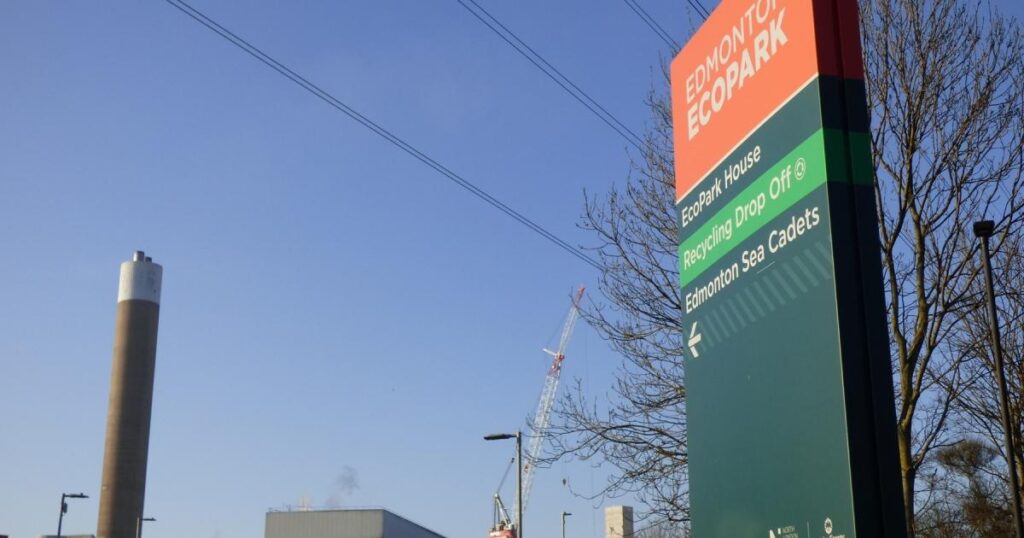The redevelopment at Edmonton Eco Park, which will replace the existing, ageing waste-burning facility has been delayed, overseers say.
They have pointed to Brexit, the war in Ukraine, and high interest rates impacting the cost of raw construction materials.
The incinerator was originally intended to be up and running by 2027.
No fresh timelines for the project have been made publicly available, but the North London Waste Authority (NLWA) – which is guiding the project – says “construction progress continues to be made”.
The NLWA is controlled by councillors from Barnet, Camden, Enfield, Hackney, Haringey, Islington and Waltham Forest, and is responsible for disposing of waste from the seven boroughs.
Construction firm Acciona is still facing “challenges,” NLWA chair Councillor Clyde Loakes said. Last year, it was reported the firm had faced “continued” delays in bringing in subcontractors for the next stage of development.
Cllr Loakes, who also serves as the deputy leader of Waltham Forest Council, told the Local Democracy Reporting Service: “The delivery of the energy recovery facility has not stopped – construction progress continues to be made, with over 200 workers on site.
“The subcontractors engaged by Acciona have consistently demonstrated excellent competency throughout the project. The civil works are largely complete and work to install the first two boilers and the steelwork for the turbines and flue gas treatment continues.
“However, as we have consistently reported publicly, there are challenges being faced by Acciona and the programme is delayed.
“Factors such as energy and raw material price shocks following the outbreak of the Ukraine war, high interest rates, and Brexit have impacted the construction industry.”
But despite the reassurances, campaigners against the scheme fear it is in “serious disarray”.
Carina Millstone, with the Stop Edmonton Incinerator Now Coalition, said: “The NLWA’s stubborn refusal to release information about the delays in the building of the new incinerator suggests to us that the relationship with Acciona has irretrievably broken down, no doubt at a hefty cost to the councils.
“We now believe the new incinerator will never be built.”
A total of £66.5 million has been allocated to the project from the Heat Networks Investment Project, a government-funded scheme aimed at increasing the number of networks in England and Wales.
The budget has already risen from £1.2 billion to £1.5bn, with the NLWA citing similar supply issues.
At a cabinet meeting in June, top councillors in Haringey agreed they would shelve their plans to pipe heat from the incinerator, citing “economic turbulence” and the need for “prudent” management.
Concerns have also been raised about the potential impact of the incinerator on air quality in north London.
Waltham Forest Conservatives leader Councillor Emma Best said Highams Park would be “covered in plumes”. The Tories claim Chingford “will continue to be exposed to highly toxic ultrafine particulates (PM0.1) from the burning of waste, which ‘constitute a significant health hazard’.
They also attacked the Labour-run council for supporting the project despite costs having “spiralled out of control”.
The North Middlesex University Hospital, which serves Enfield and Haringey, saw 14,587 children with breathing difficulties admitted in 2024. That is 220% higher than the London average.
Cllr Loakes said the NLWA was following the “well-established scientific evidence that modern and well-run facilities do not pose a significant risk to public health”.
He said: “By far the biggest source of air pollution is road traffic – even at its absolute peak level, the new facility would be responsible for just 0.52% of local particulates and 2.93% of NOx, compared to 30% from road traffic.
“More than 35 facilities have been given consent since we submitted our application, and only 3 of them will have emissions cleaning technology as good as ours.”
He said the incinerator will lead to the “best environmental outcomes” and the “best value for our council taxpayers”.
He added: “Councils must dispose of all the rubbish our residents throw away, so we need to focus on solutions to put an end to unnecessary waste, in particular plastic.”
The chair said the NLWA was “starting to see some progress, with commitments to making producers pay for the waste they create and a deposit return scheme both showing steps in the right direction”.
The NLWA previously said that while it expects “people will recycle more and produce less waste in the future” there will also be “more people producing waste, which means we need to plan for increasing volumes of waste”.




